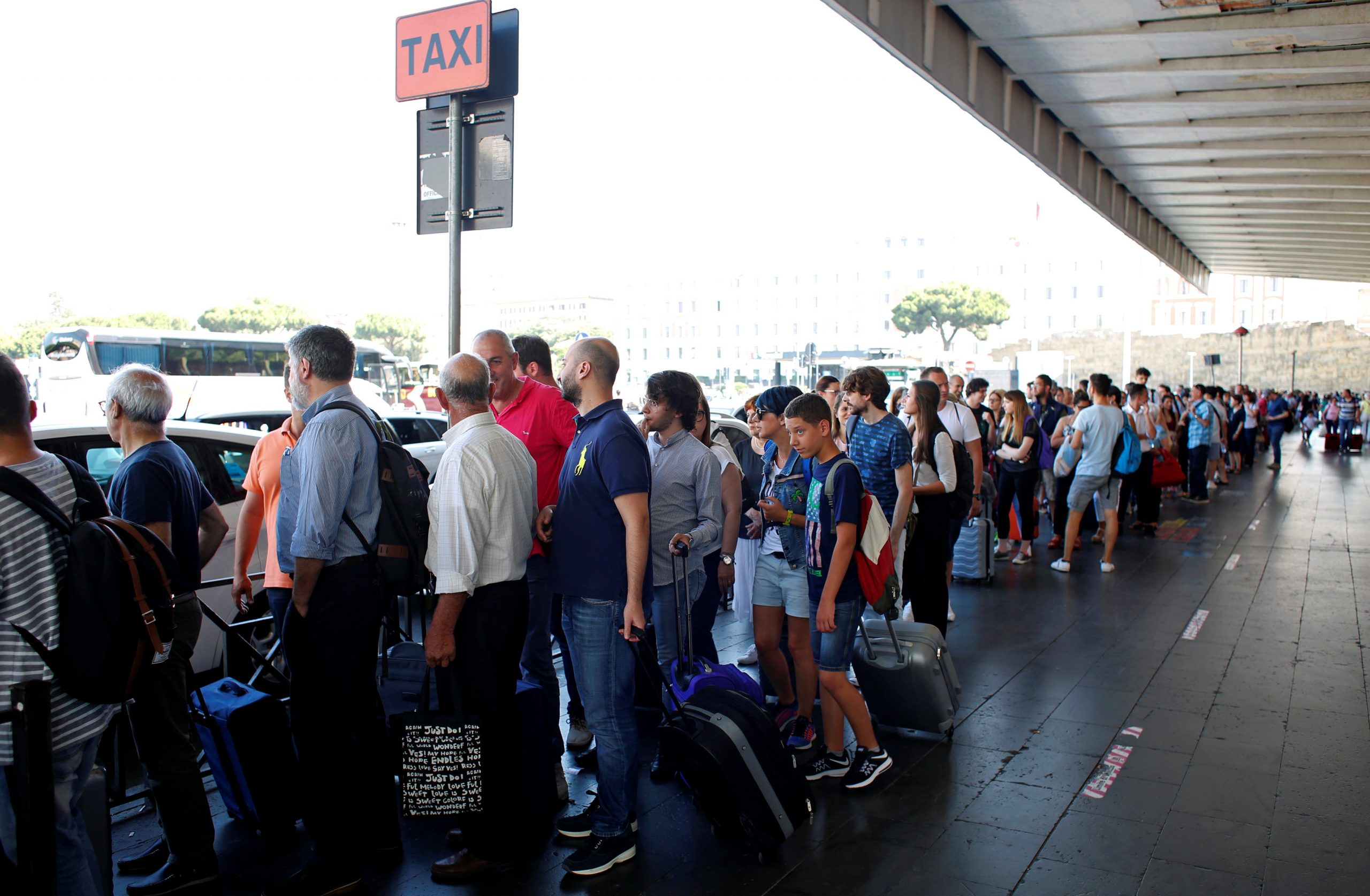MILAN—Finding a taxi in Italy’s financial capital when it is raining involves long lines and patience. During trade fairs and fashion shows it is even harder: Demand surges but the number of taxis stays the same.
Even on sunny days, there are lines of suitcase-laden travelers searching forlornly for a taxi at airports and train stations around Italy. Many locals don’t even bother trying.
Italy’s taxi drivers have for years sheltered themselves from competition by lobbying to restrict the number of taxi licenses and restrict ride-share companies such as Uber. Mayors who try to take on the taxi drivers can face strikes and road blockages that paralyze cities.
“This wait is ridiculous, but what can we do,” said Marco Mariani as he and his wife waited for a taxi in Milan’s central square. The couple were on a shopping vacation to the city and couldn’t find a ride back to their hotel.
The long wait for taxis in Milan and Rome is more than just a nuisance. Many Italians view the problem as an embarrassing example of the country’s failure to shake up its sclerotic economy, which has barely grown over the past 30 years.
A major reason for Italy’s stagnation is the power of vested-interest groups who successfully impede efforts to boost competition, innovation and productivity.
“The taxi industry is a symptom of what’s not working in Italy,” said Gabriele Grea, an economics professor at Milan’s Bocconi University specialized in transportation.
Italy’s economy is 1.5% smaller than it was in 2007, before the global financial crisis, according to the World Bank. In that time Germany’s economy has grown 17%, France’s by 13% and the U.S.’s by 28%.
Italy bounced back quickly from the deep 2020 recession caused by the Covid-19 pandemic, leading to short-lived hopes that the country might break out of its long economic malaise. Mario Draghi, who served as prime minister in 2021-22, tried to enact a series of overhauls that some economists and business people said could revive the economy’s performance.
But infighting in Draghi’s governing coalition led to his resignation before many changes were implemented. High inflation, including the energy-price spike that followed Russia’s invasion of Ukraine, and rising interest rates soon put the brakes on the recovery. Italy’s economy is forecast to grow 0.7% this year and next, according to the national statistics agency.
Much of Italy’s stasis can be traced to a lack of meritocracy that permeates the public and private sectors, said Lorenzo Codogno, an economist and consultant who co-wrote a recent book on the country’s economic decline. One place where the lack of meritocracy is most evident is in Italy’s gender gap, Codogno said.
In Italy, 55% of working-age women are employed, the lowest level in the European Union, according to the EU’s statistics service. That compares with 80% in Germany and 71% in France. While various factors push down the rate in Italy, including a lack of affordable child care, Codogno and other economists highlight cultural norms in the home and the workplace that lead many women to give up careers to raise their children.
“If politicians, employers and trade unions wanted to provide equal opportunities for everybody, they would have found solutions so workers, male and female, could better reconcile work and family life,” said Codogno.
An ingrained system that prizes seniority over the skills of individuals is also contributing to Italy’s lack of economic progress. The result is that almost 21% of Italians aged 15 to 34 aren’t employed, studying or in training, the highest in the EU. That compares with 13% in France and 10% in Germany.
For decades, Italy has also struggled to improve a painfully slow civil-justice system that puts off investors, a large underground economy, high national debts, chronic tax evasion and large differences in wealth between the country’s north and south.
Compared with other Western countries, Italy has few internationally successful startups and attracts little venture capital. Italy barely features in the leading rankings of the world’s top 100 universities, and Italian high-school students underperform most other developed countries.
Italian beaches offer another glimpse of the lack of competition and resistance to change. Year after year, the same businesses pay public authorities a small fee for lucrative concessions to rent umbrellas and reclining chairs to beachgoers. The EU has complained about the lack of competitive public tenders and the insignificant revenue the Italian government collects for those privileges.
The problems at Italy’s beaches and taxi stands show that the country’s woes are related to bad laws, rather than any inherent lack of talent or entrepreneurship in the country, said Carlo Maria Capè, the chief executive of BIP, which advises businesses in Europe and South America on using technology.

Italian businesses often pay a small fee to be allowed to rent out umbrellas and chairs on beaches. PHOTO: FRANCESCA VOLPI FOR THE WALL STREET JOURNAL
“Italy’s rules make change hard, but if the small and medium companies that make up the backbone of the economy are allowed to work, they will adapt to changes in the market,” Capè said.
Taxi drivers have successfully pushed for laws that keep ride-hailing apps such as Uber heavily restricted. Uber drivers in Italy must be licensed and have a luxury car, which makes the service more expensive than a regular taxi and dulls its appeal for most would-be users. In many Italian cities taxi drivers have blocked the issuing of new taxi licenses for the past two decades, protecting the value of their own license but making it hard to find a ride. But they are losing the nation’s sympathy.
Taxi drivers’ associations argue they don’t make enough money to survive if their market were opened up. But a taxi driver from Bologna became a cult hero on social media when he challenged that narrative by posting his daily takings on X, formerly Twitter. His popularity only grew this month when his taxi cooperative suspended him for a week for hurting its image.
Issuing more licenses wouldn’t solve the taxi problem by itself, said Grea. “It’s a prerequisite, but you need a general strategy to improve mobility in Italian cities that incorporates public and private transportation. Solve that and people will see that change is possible.”
Write to Eric Sylvers at eric.sylvers@wsj.com



